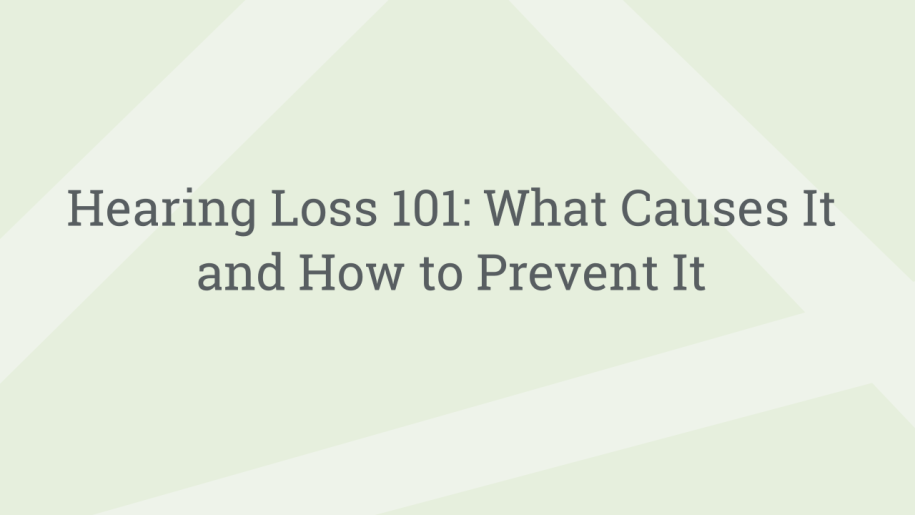Hearing Loss 101: What Causes It and How to Prevent It
Table of Contents
Introduction
Hearing impairment can affect people of all ages and backgrounds. It is a condition that affects not only the ears but also the mind and spirit. If you or someone you love is experiencing hearing loss, it can be challenging to know what to do. This blog post will cover everything you need to know about hearing loss, including how we hear, the types of hearing loss, the common causes of hearing loss, prevention strategies, and treatment options.
Understanding the Ear: How We Hear
The ear is a complex and delicate structure responsible for our hearing ability. It comprises the outer ear, middle ear, and inner ear. The outer ear consists of the pinna and ear canal, which collect and channel sound waves towards the middle ear. The middle ear consists of the eardrum and three small bones, the hammer, anvil, and stirrup, which transmit sound from the eardrum to the inner ear. The inner ear contains the cochlea, a fluid-filled organ that converts sound waves into electrical signals that travel to the brain for processing.
Types of Hearing Loss: Conductive vs. Sensorineural
Conductive hearing loss occurs when sound waves cannot travel through the outer and middle ear to the inner ear due to blockages, damage, or infections. This type of hearing loss is often treatable with medication or surgery. Sensorineural hearing loss occurs when there is damage to the inner ear or the nerve pathways that transmit sound to the brain. This type of hearing loss is usually permanent and requires hearing aids or cochlear implants to improve hearing.
Common Causes of Hearing Loss
Hearing loss can be caused by many factors, including genetics, infections, injuries, and exposure to loud noises. Some of the most common causes of hearing loss include aging, noise exposure, and ear infections. Certain medical conditions, such as diabetes and high blood pressure, can also contribute to hearing loss.
Age-Related Hearing Loss: What to Expect as You Get Older
Age-related hearing loss, also known as presbycusis, is a natural and gradual decline in hearing ability that occurs as we age. It usually affects both ears and starts to manifest in the mid to late 50s. Age-related hearing loss is characterized by difficulty hearing high-pitched sounds, hearing loss in noisy environments, and needing people to speak more loudly or clearly.
Noise-Induced Hearing Loss: How Loud Noises Damage Your Hearing
Exposure to loud noises, either at work or through recreational activities, can cause permanent hearing damage over time. Noise-induced hearing loss often happens gradually and is caused by prolonged exposure to sounds over 85 decibels (dB). This type of hearing loss can be prevented by using earplugs, earmuffs, or other forms of hearing protection.
How to Protect Your Hearing: Tips and Strategies for Prevention
Protecting your hearing is essential to prevent premature hearing loss. Some ways to protect your hearing include avoiding loud noises, wearing hearing protection when participating in loud activities or using noisy equipment, and keeping the volume low when listening to music or watching TV.
Recognizing the Signs of Hearing Loss: What to Look and Listen For
The signs of hearing loss can be subtle, making it challenging to identify at first. Some of the most common signs of hearing loss include difficulty hearing conversations in noisy environments, needing people to repeat themselves, turning up the volume on the TV or radio, and feeling like people are mumbling.
Seeking Treatment for Hearing Loss: What to Expect from a Hearing Specialist
If you suspect you have hearing loss, the first step is to visit a hearing specialist, such as an audiologist or an ENT doctor. They can perform a comprehensive hearing evaluation and identify the underlying cause of your hearing loss. Depending on the results, they may recommend hearing aids, cochlear implants, or other forms of hearing assistance.
Conclusion
Overall, hearing loss is a common but treatable condition that affects people of all ages. By understanding the types of hearing loss, common causes, prevention strategies, and treatment options discussed in this post, you can take steps to protect your hearing and improve your quality of life. If you suspect you have hearing loss, don’t hesitate to seek the help of a hearing specialist who can guide you through the process of diagnosis, treatment, and rehabilitation.

